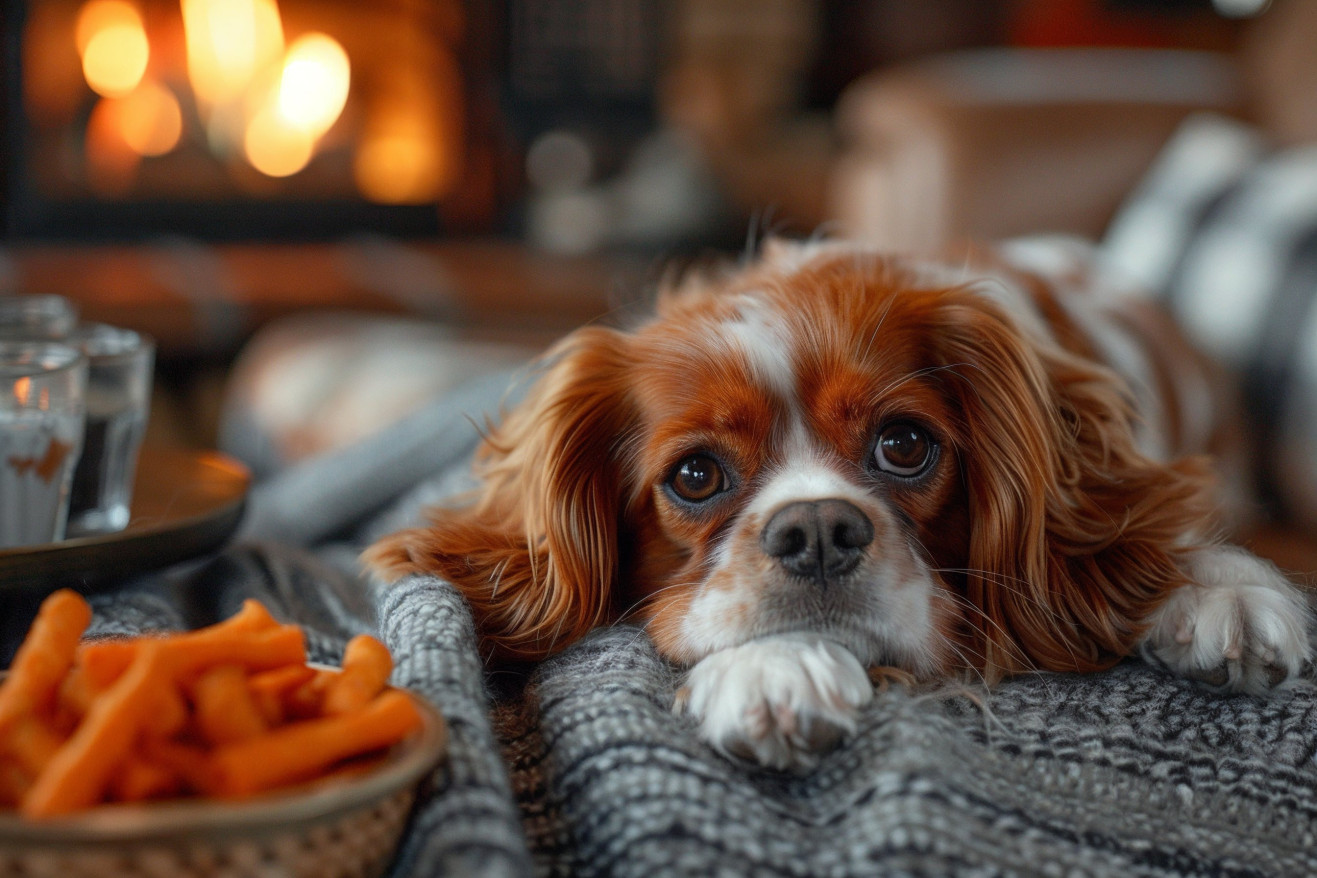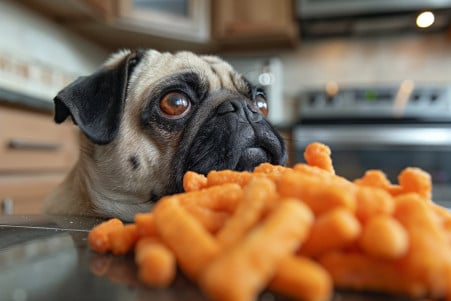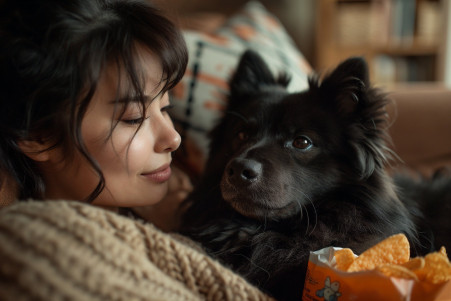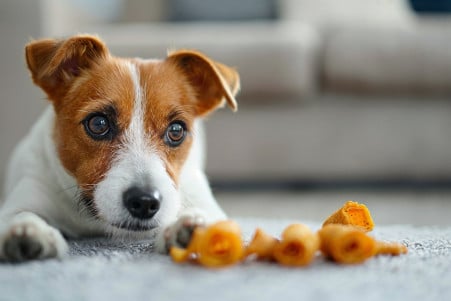Can Dogs Eat Hot Cheetos? Understanding the Risks of Spicy Snacks for Pets
27 February 2024 • Updated 27 February 2024

You may want to let your dog have a taste of your spicy snack, but is it a good idea? The short answer is no, dogs cannot eat Hot Cheetos. The high fat and spice content of Hot Cheetos can lead to stomach issues, diarrhea, and even pancreatitis in dogs. Furthermore, the onion and garlic powder used to flavor these snacks are poisonous to dogs.
This article will conduct a thorough review of dog nutrition and the impact of human snack foods on dogs. This will include veterinary opinions and toxicology studies to explain why Hot Cheetos and other similar snacks are bad for dogs. The aim of this review is to give you a better understanding of what dogs can and can’t eat, so you can make the best decisions about what to feed your pet.
Can dogs eat hot cheetos?
How Do Dogs Digest Food? The Science Behind Dogs’ Inability to Eat Human Snacks
The canine digestive system, described by the Merck Veterinary Manual, is a complex system that includes the mouth, esophagus, stomach, and intestines, and ends at the rectum and anus. This system also includes important accessory organs such as the liver and pancreas, and it is responsible for digesting food, absorbing nutrients, and getting rid of waste.
Dogs have a shorter digestive tract than humans, and according to a study in PMC, the digestive abilities of dogs are dependent on their size.
This means that things like enzyme activity and nutrient absorption are impacted by size, and it shows that dogs need to be fed diets that are based on their digestive physiology.
In fact, because of the way dogs’ digestive systems work, foods that are high in fat and spice, like Hot Cheetos, can throw off the balance of the digestive system and lead to digestive issues or even pancreatitis, which is an inflammatory condition. In addition, dogs don’t have the same ability to digest complex food compounds as humans, and this can lead to problems when they eat human food.
By explaining how dogs’ digestive systems work, we can show how important it is to feed dogs foods that are based on their digestive physiology, and this can help people understand the potential dangers of feeding dogs human food, especially human food that is high in spice and fat.
How Capsaicin Affects Dogs
Capsaicin is the active ingredient in chili peppers that gives them their heat. While it’s a popular ingredient in many human foods, its impact on dogs is a little different.
In addition to causing irritation and a burning sensation in people, capsaicin can also cause similar reactions in animals, particularly dogs.
A study published on PubMed demonstrated that capsaicin derived from pepper plant extracts caused a variety of cardiac effects in dogs, including hypotension and bradycardia. However, when researchers administered pure trans-capsaicin, the stereoisomer that naturally occurs in chili peppers, to dogs via an intravenous injection, they found that it had a different toxicity profile, causing minimal organ toxicities and transient tachycardia and hypertension.
This data shows that while dogs may not be as toxicologically sensitive to capsaicin as they are to other human food contaminants, the consumption of capsaicin can still have a significant impact on their heart health. This is an important reminder to dog owners that what may seem like an innocent indulgence can have real consequences for their pet.
As a result, pet owners should be careful about adding capsaicin to their pet’s diet and make sure that they prioritize their pet’s health and safety.
What Vets Say About Dogs and Hot Cheetos
Veterinary experts are unequivocal in their advice that dogs should not eat Hot Cheetos, and for good reason. According to FluentWoof, veterinary professional Dr. Edele Grey confirms that while Hot Cheetos aren’t poisonous to dogs, they can cause a range of health problems, including gastrointestinal issues and even pancreatitis, which can be life-threatening, because of their high fat and calorie content.
Moreover, the onion and garlic powder in Hot Cheetos, which are toxic to dogs, can be especially dangerous when consumed in large amounts.
The Fi Team blog, which is backed by TryFi, agrees, noting that the high levels of sodium and artificial ingredients in Cheetos can lead to dehydration and other issues, including allergic reactions, in dogs.
In an article for DogsPlanet, Veterinary Surgeon Ruth Cawston also confirms these concerns, noting that the high fat and calorie content of Hot Cheetos and the presence of certain ingredients that can upset a dog’s stomach make them a bad choice for dogs, especially those with underlying health issues.
If a dog does eat Hot Cheetos, veterinarians recommend that the owner give the dog fresh water and keep a close eye on them for any signs of distress. If the dog continues to show symptoms, a trip to the vet is in order. To avoid these situations, experts recommend that pet owners keep human food out of their pets’ reach and feed them a diet that’s tailored to their nutritional needs.
The Health Risks of Feeding Dogs Spicy Foods
Spicy foods, which are not meant for dogs, can cause a lot of stress on a dog’s digestive system. According to Hill’s Pet, spicy ingredients like chili powder and Sriracha can cause a range of issues, including stomach pain, diarrhea, and excessive thirst that can lead to vomiting.
Meanwhile, garlic and onions, which are often considered healthy for people, are especially dangerous for dogs because they can cause red blood cell damage and anemia, even in powdered form.
According to MasterClass, spicy foods that contain chili peppers or seasonings can cause short-term stomach issues and long-term health problems. Meanwhile, The Dodo says that spicy foods can lead to gastroenteritis, which causes vomiting and diarrhea.
In some cases, this can even lead to pancreatitis. The article also says that hot sauces, which often contain capsaicin, can be especially dangerous for dogs and can cause mouth burns and diarrhea, and the presence of onion and garlic increases the toxicity.
To keep dogs safe from these health issues, pet parents should make sure to avoid feeding their dogs spicy human foods. Instead, they should make sure their dogs are eating a diet that meets their specific nutritional needs to make sure their health and well-being isn’t compromised by the temptation of human treats.
Pet Food Safety Versus Human Snack Safety
If you’re a pet owner, it’s important to know the difference between pet food safety and human snack safety. Pet food is regulated under the Federal Food, Drug, and Cosmetic Act, which means the FDA is responsible for ensuring that animal foods are safe, produced under sanitary conditions, and labeled accurately.
On the other hand, human snacks are safe for people but often contain ingredients that are toxic to pets, including chocolate, caffeine, onions, and garlic, according to Medical News Today and the Animal Emergency & Referral Associates.
Before you give your pet any snacks, you should be aware of the potential health risks of these ingredients. According to the FDA and the AERA, even foods that are not toxic to pets can cause digestive upset or pancreatitis because of their high fat content. In addition, pet food is subject to different regulations than human food, including specific rules about labeling and ingredient safety, according to the FDA.
To keep your dog safe, make sure to give them treats that are made for dogs and always give them in moderation.
If you want to give your dog a snack that’s similar to Hot Cheetos, you can try giving them carrots, apples, or plain popcorn, which can give them the crunch they crave without the risks. By choosing treats carefully, you can help ensure your pet lives a long, healthy life without exposing them to unnecessary risks from human snack foods.
Final Thoughts on Dog Nutrition and Hot Cheetos
To sum up, Hot Cheetos and other spicy snacks are not safe for dogs because of the ingredients that can lead to digestive upset, toxicity, and other health issues.
The high fat content, capsaicin, and toxic additives like onion and garlic powder found in these snacks all contribute to the danger they pose to our dogs. It’s important that we understand the nuances of dog digestion in order to feed them in a way that supports their health.
As dog owners, it’s important that we prioritize feeding our dogs a healthy, species-appropriate diet. This includes avoiding human snacks and sticking to dog-friendly treats in order to avoid health issues and support our dogs in living their best lives.
By prioritizing the health and nutrition of our pets, we can work to build a community of pet owners who are informed and dedicated to the well-being of their pets. By making choices that support our pets’ health, we can ensure that they live their best lives by our sides.


